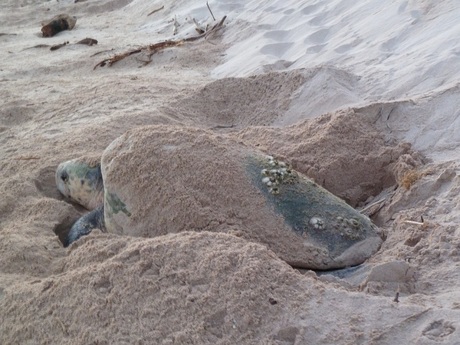How reptile embryos cope with climate change

Western Australian researchers have discovered that the ability of sea turtles to respond to heat stress varies with their genes. The study was carried out by The University of Western Australia (UWA), the Department of Parks and Wildlife, CSIRO and the Australian Institute of Marine Science.
The team studied the eggs of loggerhead sea turtles, a wild and endangered species, from two different Western Australian beaches in order to learn how reptile embryos may be able to adapt to global warming. It is claimed that their research is the first to look at geographical and genetic variation in sea turtle embryos’ physiological response to heat pressure.
“The capacity of species to respond adaptively to warming temperatures will be key to their survival in the Anthropocene,” the researchers wrote in the journal Proceedings of the Royal Society B. “The embryos of egg-laying species such as sea turtles have limited behavioural means for avoiding high nest temperatures, and responses at the physiological level may be critical to coping with predicted global temperature increases.”
Dr Jamie Tedeschi, from UWA’s School of Animal Biology, said the team “incubated the eggs in the lab at normal temperatures and then gave them a short heat shock at a high temperature”. They then compared the activity of heat-shock genes — which allow sea turtles to tolerate high temperatures — in control and thermally challenged embryos, looking for variation among individuals and between populations.
The researchers found there is significant variation in heat-shock proteins produced by sea turtles and that the differences are inherited across generations, which is important if turtles are to adapt to a changing environment. Dr Tedeschi noted, “Genetic variation forms the building blocks of evolution, and it needs to be present for organisms to adapt to changing conditions.”
“This is the first evidence that the heat-shock response is heritable in sea turtles and operates at the embryonic stage in any reptile,” the researchers concluded. “The presence of heritable variation in the expression of key thermotolerance genes is necessary for sea turtles to adapt at a molecular level to warming incubation environments.”
'Low-risk' antibiotic linked to rise of dangerous superbug
A new study has challenged the long-held belief that rifaximin — commonly prescribed to...
Robotic hand helps cultivate baby corals for reef restoration
The soft robotic hand could revolutionise the delicate, labour-intensive process of cultivating...
Stem cell experiments conducted in space
Scientists are one step closer to manufacturing stem cells in space — which could speed up...




